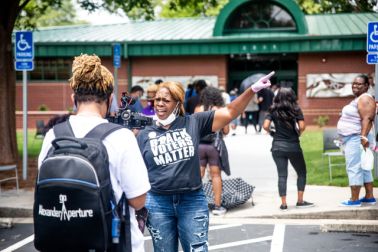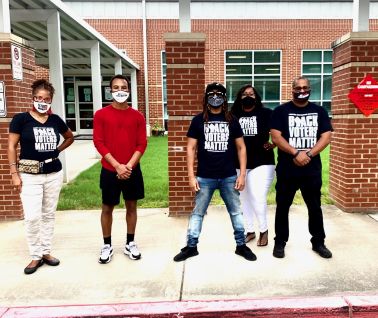
Source: Dean Anthony II / BVMF
“Somebody just texted me, I’m a little—that LeBron James tweeted something about me. And I love him,” LaTosha Brown, co-founder of the Black Voters Matter Fund (BVMF) said in the middle of her interview with MadameNoire over the phone.
Instantly we pause the conversation so that she can take in the moment and compose a response tweet.
“That is pretty darn cool,” she continues after tweeting him back. “I needed that.”
While her excitement is palpable over the phone, the reasoning behind the NBA superstar’s tweet is quite the opposite.
Brown, whose organization is dedicated to bolster rights and access for Black voters, was the recent victim of voter suppression on Tuesday during Georgia’s primary, tweeting that she spent three hours at the polls. On Tuesday Georgia, along with Nevada, North Dakota, South Carolina and West Virginia, held the first major step in a long line of events leading to Election Day in November.
But Brown wasn’t the only one. And her encounter with voting in Atlanta was shared by many Georgians who felt triggered by previous voting experiences. In 2016 with the election of Donald Trump, and again in 2018 when Stacey Abrams unsuccessfully tried to highlight voter suppression in her gubernatorial bid against Governor Brian Kemp, and how it was used to swipe a fair election right under her grasp.
For Brown, a Selma, Alabama, native, this fight is centered in her being.
“I feel like I am in the perfect storm. I feel like this moment is a culmination of so much that has influenced and shaped me as an activist, as a Black woman, as a southerner.”
To maintain a sense of normalcy in this climate she leans on her craft as a professional singer, working in her “victory and peace garden,” meditative prayer and letting herself be swept up by the sounds of nature in her yard.
As a Black woman, Brown also understands that her group remains underserved in the political arena. While Black women’s voting power is acknowledged and lauded, there remains a gap of understanding and dividends have spilled over into the collection plate. It is time for Black women to be thoroughly heard and for policy to align in its place.
“We’ve never had representation but in the last 50 years, we have been the most consistent turnout base than any constituency in this country,” Brown continued. “How has our participation elevated the positioning the access to power? But when you look at our health outcomes, when you look at our economics. We’re paid on pennies on the dollar compared to our white male counterparts. Yet we’re more loyal and consistent to the Democratic party then they are.”
In the middle of a global pandemic which has largely taken a back seat due to the ongoing police brutality and degradation of Black communities, Brown’s voice remains steady and powerful over the phone, creating a great sense of comfort in a sea of turbulence.
Brown and her frequent collaborator Cliff Albright founded the BVMF in 2016 when stakes were again at an all-time high.
“We saw how the political environment was shifting when he [Trump] was running for office and he was a republican nominee and that’s when we knew we had to literally like put—get our institution together. Not necessarily in reaction to him, but in reaction to what we felt was coming down the pipeline for our communities,” she said. “And so we moved immediately. We hit the ground and we have not stopped.”
Even on Tuesday and in the days leading up to Georgia’s primary, BVMF held virtual town halls to engage voters, used text messaging services to distribute needed information, or connected voters with much needed information and tools. At the polls where voters waited in lines for hours, BVMF organizers also handed out water, food, masks and hand sanitizer.
BVMF is also documenting the experiences of Black voters through photo and video accounts. They have met with and called on officials of the Georgia Board of Elections to investigate and eliminate all forms of suppression used to silence Black voices in the voting booth.
Hours later, Brown and Albright joined Justin Beiber’s manager Scooter Braun to discuss the day’s events in Georgia on Beiber’s Instgram page.
“We’re trying to use every tool that is available to us to actually be able to be of service to Black voters because we do think that what is most important than their vote is they are,” Brown said. “Which is why our organization is called ‘Black Voters’ not ‘Black Votes.’ Because we can get a lot of people who care about Black votes, but not Black voters. We center Black voters.”
The BVMF serves multiple communities in what Brown calls the “Black Belt,” reaching from North Carolina to the Mississippi Delta, to gain access to resources, tools in regions that have been largely forgotten by politicians and the voting electorate. Over the last year, the group has raised close to $1M which was raised by crowdfunding, private donations, and organizational contributions.
“Our organization exists as a capacity building institute,” she said. “The goal is to get resources, to raise resources. We’ve funded close to 200 groups over the course of the last three years. Black led grassroot groups who are the front lines of doing power building work. Not just around elections, we do work 365 days out of the year.”
Their newest campaign WE GOT THE POWER, aims to shape and educate Black voters that they are the ones with the influence, not the politicians.
“For us we think the real power rests with the people. Not necessarily just in the process and we think of so many ways that there’s been campaigns had people to believe in a process that they see has been fundamentally unjust and unfair. So ours is where’s the center of gravity? We think that the center of gravity is around change, and seeing that people have the power. Not the process. The process just facilities people demonstrating and utilizing their agency.
Brown, Albright and BVMF organizers are cross reaching in their approach, calling on leaders from reproductive rights groups to grassroot advocacy organizations, to larger civil rights collectives like the NAACP Legal Defense Fund, to collaborate and share effective tools Black voters need.

Source: Dean Anthony II / BVMF
Although the Black vote and voter suppression remains a critical area to Brown, the BVMF understands all too well that all of it is connected to social justice. BVMF leans heavily into the different arms of the resistance movement, including demonstrations and protesting. The organization recently created the Resistance Fund to help provide financial assistance to demonstrators arrested by police.
Brown knows that there is far reaching policy that needs to be enacted and implemented in regards to Black communities and access to healthcare, economic stability, housing, proper care for Black elders, and a divestment away from funding for police departments.
“We see this as a movement. We want everybody to feel a part of this. We want people to recognize the opportunity. We believe this is going to be people driven, people funded and people sustaining,” Brown said.”









